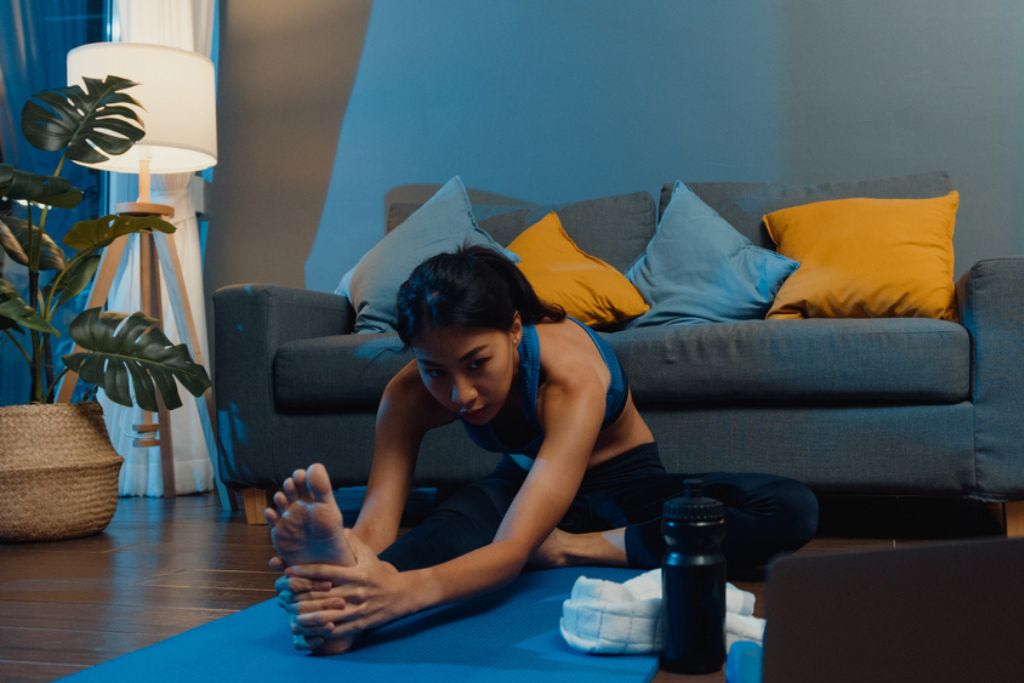Working Out Before Bed: Is It Bad For You?

July 27, 2023 - Updated September 5, 2024

When life is busy and finding more than 30 minutes of free time is a struggle, many of us are left with two options when it comes to working out - wake up even earlier, or train in the evening. If you’re not a morning person or cutting down your sleeping hours just isn’t sustainable, evenings it is!
If you’re trying to find your perfect time to Sweat, you might be wondering - is it bad to exercise before bed? For years, people have been warned that nighttime exercise may negatively effect sleep. Here’s what you need to know about evening Sweat sessions.
The connection between exercise and sleep
It’s well-known that working out is beneficial for sleep, with plenty of research demonstrating that regular exercise has positive effects on factors such as sleep quality, the speed at which you fall asleep, and your total sleep time. That is not up for debate and is an incredible reason to get moving more often. What is in question is the specific timing of your workouts. If you work out too close to bedtime, do the effects on your sleep go from positive to negative as many people believe?

The answer: You probably don’t need to worry about it
Great news for all the nighttime exercise lovers out there - we dove into the research and the idea that evening workouts adversely affect your sleep seems to largely be a myth.
One 2014 cross-sectional study of 1000 American adults aged 23-60 looked at self-reported outcomes after exercising at different times including sleep quality, sleep time, time to fall asleep and waking unrefreshed. Although the best sleep outcomes were reported for those who did vigorous exercise in the morning, evening exercise was not associated with worse sleep, and most individuals believed their sleep was of equal or better quality and duration on days they exercised.
Another 2019 meta-analysis also took into consideration variables such as workout intensity and duration. After examining 23 studies, the researchers found evening exercise did not negatively impact sleep. In fact, it seemed to help people fall asleep faster and spend more time in deep sleep.
Except for this one thing
However, their research did find one scenario where nighttime exercise and sleep are not a match made in heaven: when you perform high-intensity exercise or interval training less than an hour before bedtime. Those habits took a toll on sleep, resulting in a longer time to fall asleep and poorer sleep quality. Harvard Health also recommends avoiding strenuous physical activity late in the evening.
Another 2020 randomised controlled trial involved men and women taking part in moderate-intensity 60-minute exercise sessions two or four hours before bedtime, and found it didn’t disrupt their sleep! Interestingly, sleep quality improvements were only observed when exercise was performed four hours before bed, rather than two. Again, if you’re after those sleep-boosting benefits, make sure your workout is done and dusted a few hours before you’re planning to hit the hay.
Want even more evidence of why it’s more than okay to sneak in a nighttime Sweat session? A 2021 review of 15 studies of high-intensity evening exercise found regular evening workouts didn’t disrupt sleep, as long as they were performed two to four hours before bedtime.

Better evening workouts for better sleep
If getting a good night’s sleep is a regular challenge for you, it can help to keep a diary of your sleep and workout habits - keeping a note of things like workout times, duration, intensity and training styles - to see if there’s a correlation between the two.
Helpful tips for a good evening workout and a good sleep:
Make sure you’ve finished your workout at least an hour or two before bed, especially if you’re doing high-intensity exercise or plan on having a post-workout meal. This will allow your body to have enough time to cool down, rest and digest (unless you want to be feeling that endorphin rush when you’re trying to sleep!).
If the evening is your only time to exercise but it’s affecting your sleep, experiment with different training styles and intensities to find which habits lead to better sleep. The Sleep Foundation recommends trying morning workouts if you think evening exercise is messing with your sleep, and vice versa.
If you’re working out close to bedtime, avoid workouts that leave you feeling hot for hours, as increased body temperature can interfere with sleep.
Always end your workout with a cooldown and stretching to gradually bring down your heart rate and relax any muscle tension.
If you just want to move your body to relieve stress at the end of the day without it affecting your sleep, light to moderate-intensity activities such as walking, yoga and stretching all get the green light.
Listen to your body - what works for other people won’t necessarily work for you!
If you currently work out in the evening, feel great, sleep well and aren’t experiencing any adverse effects - don’t worry about changing your routine!
Regularly working up a Sweat is highly beneficial for your sleep, and contrary to a widely believed theory, exercising at night won’t stop most people from sleeping well. Just make sure you leave yourself at least an hour between your workout and tucking yourself into bed.
Love training in the evenings but just can’t get a good sleep? Do some trial and error. See if you sleep better on nights when you haven’t exercised, when you opt for a low-intensity session instead, or when you have an extra hour or two to cool down afterwards.

A more empowered you starts with Sweat, and our editorial team is here to bring you the latest fitness tips, trainer recommendations, wellbeing news, nutritional advice, nourishing recipes and free workouts.
* Disclaimer: This blog post is not intended to replace the advice of a medical professional. The above information should not be used to diagnose, treat, or prevent any disease or medical condition. Please consult your doctor before making any changes to your diet, sleep methods, daily activity, or fitness routine. Sweat assumes no responsibility for any personal injury or damage sustained by any recommendations, opinions, or advice given in this article.
Fitness